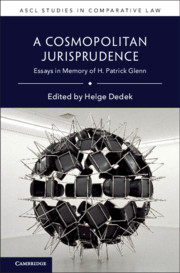Book contents
- A Cosmopolitan Jurisprudence
- ASCL Studies in Comparative Law
- A Cosmopolitan Jurisprudence
- Copyright page
- Epigraph
- Contents
- Foreword
- Acknowledgements
- Notes on Contributors
- Images
- Introduction
- Part I The Tradition of Comparative Law
- Part II The Concept of Tradition
- 6 Too Much Information
- 7 Legal Systems as Legal Traditions
- 8 Learning from Patrick Glenn: Tradition, Change, and Innovation
- 9 The Sunni Legal Tradition: An Overview of Pluralism, Formalism, and Reform
- 10 Commensurability, Comparative Law, and Confucian Legal Tradition
- Part III Crossing Boundaries
- H Patrick Glenn Publications
- Index
6 - Too Much Information
from Part II - The Concept of Tradition
Published online by Cambridge University Press: 10 December 2021
- A Cosmopolitan Jurisprudence
- ASCL Studies in Comparative Law
- A Cosmopolitan Jurisprudence
- Copyright page
- Epigraph
- Contents
- Foreword
- Acknowledgements
- Notes on Contributors
- Images
- Introduction
- Part I The Tradition of Comparative Law
- Part II The Concept of Tradition
- 6 Too Much Information
- 7 Legal Systems as Legal Traditions
- 8 Learning from Patrick Glenn: Tradition, Change, and Innovation
- 9 The Sunni Legal Tradition: An Overview of Pluralism, Formalism, and Reform
- 10 Commensurability, Comparative Law, and Confucian Legal Tradition
- Part III Crossing Boundaries
- H Patrick Glenn Publications
- Index
Summary
This chapter explicates, explores, and commends Patrick Glenn’s choice to recognize and emphasize the significance of tradition, his master concept for understanding law, in the workings of all legal orders. However, it does not share the evangelical enthusiasm that Glenn suggests should flow from this recognition. That enthusiasm is based, I argue, on a quite idiosyncratic and contestable conception of what traditions ‘truly’ involve, absent contingency or corruption. Glenn believes that recognizing the traditionality of legal orders allows us to see them as open to greater mutual recognition, tolerance, conciliatory living together, than we commonly recognize when we speak in other terms, say, of legal systems, cultures, families, and so forth. Without his excessively sunny conception of the nature of tradition as its foundation, however, a lot of the ‘conciliatory’ hopefulness so winning in Glenn’s writings seems to rest on shifting and uncertain ground. We should acknowledge that law is typically founded on and in traditions, that complex legal orders indeed typically are traditions, simply because these are facts, and important ones. I fear, however, that such acknowledgment will of itself do little to advance the mutual accommodations among legal and social orders that Glenn admirably favours.
Keywords
- Type
- Chapter
- Information
- A Cosmopolitan JurisprudenceEssays in Memory of H. Patrick Glenn, pp. 117 - 142Publisher: Cambridge University PressPrint publication year: 2021



